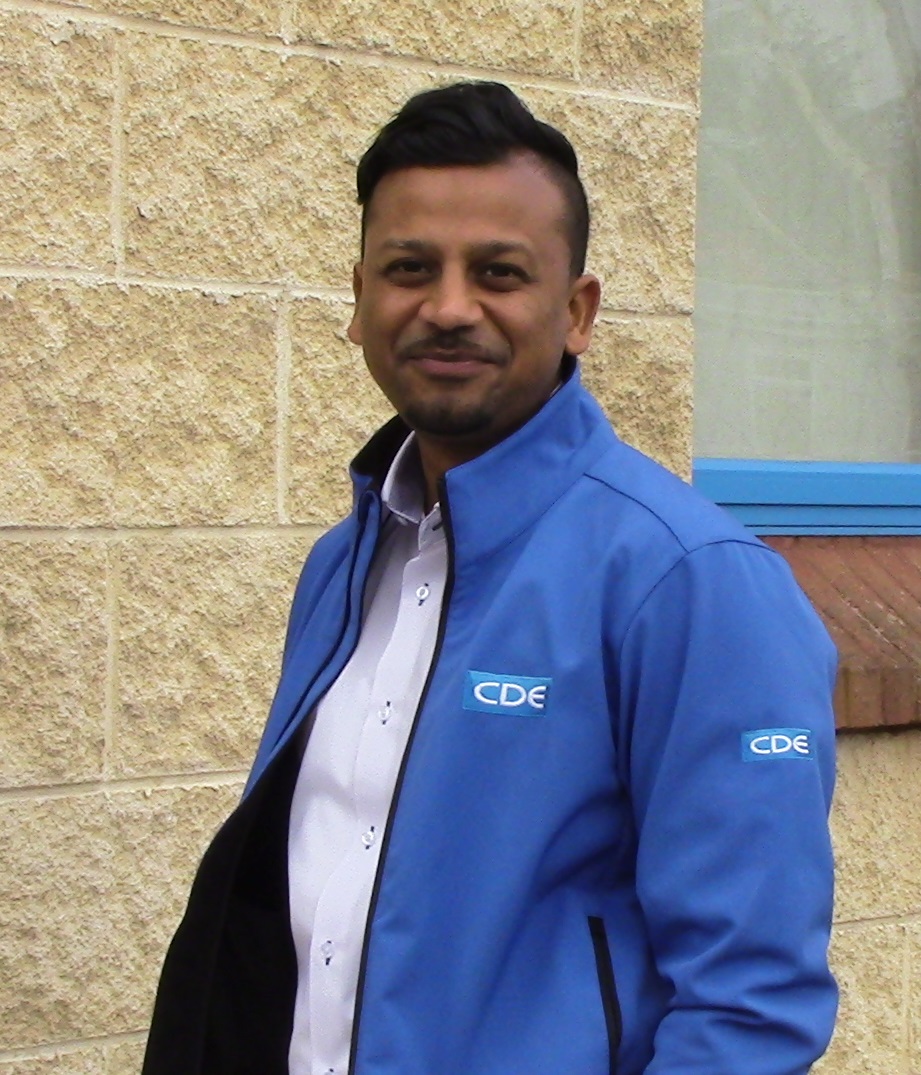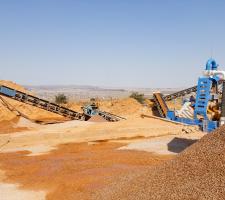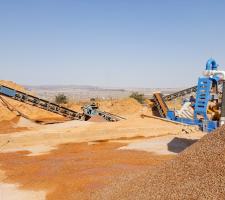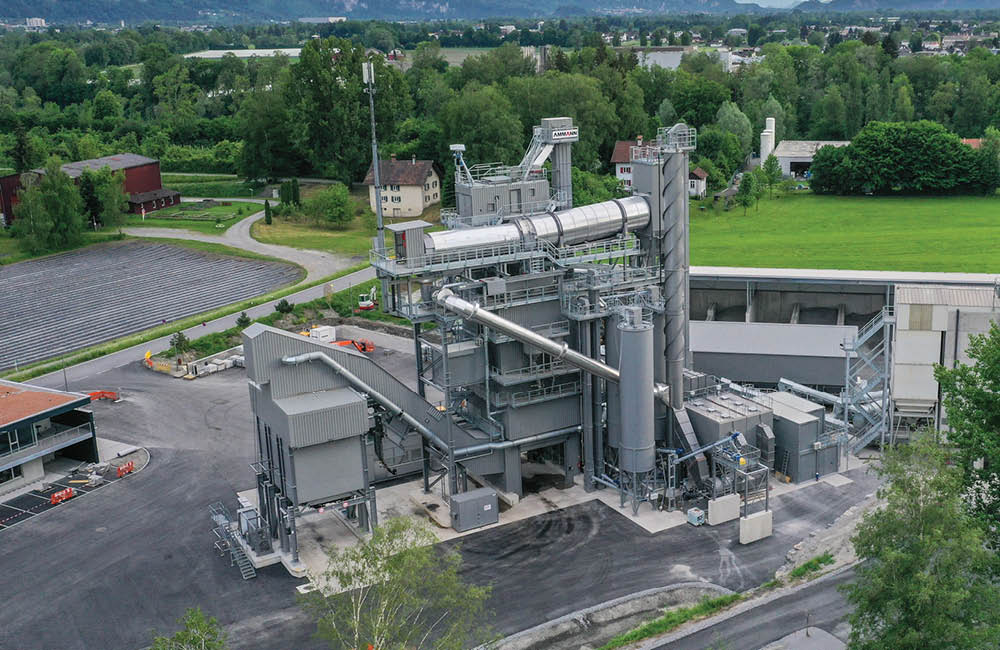
Equipped with a decade-long wealth of experience in the African aggregates industry, Nicolan Govender has been entrusted to lead the growth strategy of global wet processing equipment company, CDE, in sub-Saharan Africa, writes Munesu Shoko.
Strategy can help organisations to focus on the objectives that are most likely to deliver the best customer service, performance and profit, both now and in the future. For leading wet processing equipment company,
From its inception in 1992, CDE adopted a global strategy to go direct to the customer rather than via distributors. The same strategy formed the basis of its South African business when it first established itself in 2008. As part of the company’s 2020 Vision, a key objective is to establish a fully-fledged CDE office with a full staff complement in South Africa, acting as the springboard into the rest of the sub-Saharan African (SSA) region.
Nicolan Govender, a doyen of the African mining and sand and aggregates industry, which is a key focus market for CDE in Africa, was entrusted to lead the company’s African ventures when he took the reins as regional manager Africa in 2015.
Govender has extensive knowledge of both the mining and aggregates sectors. After graduating with a BSc. Engineering (Mechanical) degree at the University of Durban-Westville in 2002, he joined a mining design company in 2003 as a trainee design engineer. He later moved up the ladder to become applications engineer and also assisted with direct sales.
In 2004, he joined one of the prominent local crushing and screening companies in South Africa as sales engineer, where he specialised in applications including mining and construction, and worked in a variety of countries such as South Africa, Botswana and Mozambique, to mention just a few. He was later appointed national sales manager in 2008 and managed the company’s South African sales team until 2015 when he assumed his current role as regional manager for SSA at CDE.
In a recent all-encompassing interview with Aggregates Business International, Govender reflected on a number of issues ranging from CDE’s direct approach, target markets, the state of the African market and the outlook of the business.
It is a norm for many OEMs to engage export markets through distributors, but CDE has always had a different approach, opting to deal directly with its customers in its global markets. The biggest hurdle, according to Govender, to developing the wet processing business in Africa is that many existing local operators are focused solely on crushing and screening. “While washing occurs as a result of crushing and screening, it is a specialised and niche application. Wet processing is much more specific than crushing and screening because it further entails the process of downsizing material from millimetre to micron sizes,” says Govender.
Consequently, Govender says the decision to go direct to market was largely down to the company’s awareness of a lack of informed representation in the washing space.
“Servicing our customers directly also strengthens business relationships, while building a profound understanding of our customers’ operations over time,” he says.
The strategy is already yielding tangible upshots. The company’s growing installed base is evidence of the success of its direct approach in Africa. “Last year alone, we sold just under ZAR35 million worth of equipment in the region, which, in a market well-known to be currently depressed, is quite a success,” says Govender.
A total of nine installations, eight in South Africa, and one elsewhere in Africa, led to a successful 2016. While the C&D waste recycling market is a big venture for crushing and screening equipment, especially in South Africa, Govender notes that this market hasn’t taken off yet for washing equipment suppliers.
Govender is especially proud of some of the key installations completed to date, which he believes are showcasing the company’s washing prowess, while the local CDE team can also leverage case studies from its installed base on the continent. Leading with a number of installations is a Johannesburg-based supplier of sand, which has already taken delivery of three CDE plants to date. A block manufacturer in the KwaZulu-Natal area of South Africa is another company that recently joined the growing list of CDE plant operators.
Elsewhere, through the supply of a CDE EvoWash wet processing plant and an AquaCycle water recovery system, CDE recently helped Free State-based Mission Point Mining, a mining operation which supplies silica sand to the construction industry, to decrease its water consumption significantly. Meanwhile, following the arrival of a CDE EvoWash on its Analiza Quarry site, South African brick and block manufacturer Multi Crete Bricks has remedied the substantial loss of valuable fines that ended up in its quarry dam.
“Our strength lies in the fact that we provide a solution, not just equipment. Every plant may look similar but there are integral changes made to suit certain specifications for each customer,” says Govender.
A sound example is the CDE AquaCycle water recovery system. “Basically in a washing environment, one would use up to 200 m³ of water per hour, for example. Operations then build settling ponds, which are already an environmental issue and a safety hazard. The CDE AquaCycle recycles up to 90% of the operation’s waste water in the washing circuit, helping to create sludge dams, instead of tailing dams,” reasons Govender.
He argues that washing has to form part of all profit-seeking sand and aggregate suppliers. “Most of them require washing now. It is a specialised process, which calls for specialised equipment, and if you get it wrong, you end up losing your sellable product into your tailing dams,” says Govender. “That’s where we come in. Our strategy is based on improving existing plants. We do a site audit, which entails the testing of feed material, washed product on stockpiles and most importantly, tailing dams.”
More often than not, in operations using conventional washing systems, CDE has discovered that about 30% of their so-called waste is actually usable product sitting in ponds, translating into big losses over a period of time.
“We don’t approach customers and just offer them a wet processing solution. Our proposals are based on a return on investment plan,” Govender says. For example, the return on investment on a South African block manufacturer’s plant is based on reduced use of cement in its block-making process. The company now saves 10% on its cement consumption every month, which will cover the cost of repayment of their CDE EvoWash wet processing plant to the bank in just seven months.
Speaking of market conditions, Govender says the African market is currently depressed due to the current downward mining and oil prices. He, however, finds East Africa to be an interesting market due to the current infrastructure drive in countries such as Kenya, Tanzania and Ethiopia.
When it comes to market size, Govender is of the view that though the sand market is a big sector in Africa, the wet processing component is still fairly under-developed. However, he also thinks that the manufactured sand market is generally larger than the aggregates market, and predicts it to reach around 60% of the total aggregates market in South Africa.
“Of that 60%, there is about 10-15% of washing. It is a small market, but all indications are that wet processing will grow. Our products offer well-shaped, washed and graded manufactured sand, helping to replace natural sand, which is fast becoming scarce and expensive,” concludes Govender.










